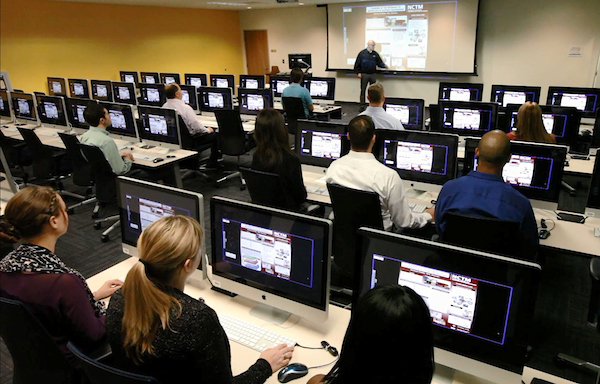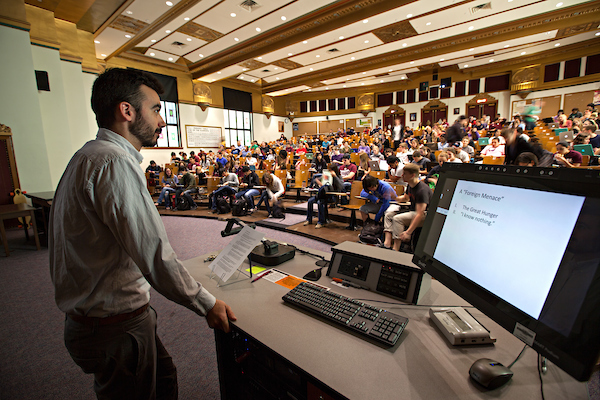Seeking Guidance and Support
-
The guidelines for faculty members who are targets of threat or harassment has been finalized and is available here.
-
The Faculty Ombuds Officer serves as an independent, confidential, and impartial resource for faculty. The primary responsibility of the ombuds officer is to raise and clarify issues and concerns, identify opinions, and request assistance to informally resolve workplace conflicts. In cases where informal resolution efforts fail or are not advisable, the ombuds officer will counsel faculty of their options for formal action and will direct them to the appropriate university rules, resources, and offices.
Learn more about the Faculty Ombuds Officer.
-
Mediation is a voluntary, confidential process, and it does not limit or preclude the pursuit of any other action related to a grievance, including the filing of a formal grievance. The Faculty Ombuds Officer coordinates mediation services for faculty and administrators.
External mediators can also be consulted, but will require payment from the unit(s) and/or individual(s) involved.
-
Faculty who believe they have been the subject of discrimination and/or harassment on the basis of race, color, sex, gender identity, age, religion, disability, national origin, sexual orientation, genetic information, veteran status, or any other characteristic protected by federal, state, or local law, should contact the Department of Civil Rights and Equity Investigations (CREI) at (979) 458-8407 or civilrights@tamu.edu.
Reminder: Faculty are mandated reporters of civil rights issues and violations.
-
Faculty Affairs is a resource for questions or concerns about the rights, protections and processes related to faculty within the university. Contact facultyaffairs@tamu.edu or fa-grievances@tamu.edu.
-
Students, staff, faculty and/or individuals from outside of the university can submit complaints regarding Texas A&M faculty and faculty administrators here.
Grievance Information
-
Faculty complaints pertaining to conditions of work, hours or salary resulting from a decision issued by a college/school Dean (or by the Provost).
Faculty appeals to the University Grievance Committee - with respect to dismissal for cause decisions and disciplinary sanctions of faculty members that have been found responsible for msconduct or serious misconduct - also qualify.
Faculty members who believe they have any such cause to grieve should follow the processes for addressing these types of grievances as covered in Standard Administrative Procedure 12.99.99.M0.01 - Procedures for Appeal of Faculty Complaints and Appeal of Dismissals and Sanctions for Misconduct or Serious Misconduct.
-
- Faculty who believe they have cause for a work-related grievance are encouraged to make an appointment to speak with the Faculty Ombuds Officer. The Faculty Ombuds Officer coordinates mediation services and provides a consultation about issues.
- If a grievance cannot be resolved at the college/school level, a faculty member can appeal to the University Grievance Committee
- If a faculty member decides to appeal a dismissal or appointment non-renewal decision, they can appeal to the Committee on Academic Freedom, Responsibility and Tenure (Learn More in the Following Sections)
- Faculty who believe they have been the subject of discrimination and/or harassment on the basis of race, color, sex, gender identity, age, religion, disability, national origin, sexual orientation, genetic information, veteran status, or any other characteristic protected by federal, state, or local law, should contact the Department of Civil Rights and Equity Investigations (CREI)
- Faculty who believe they have cause for a work-related grievance are encouraged to make an appointment to speak with the Faculty Ombuds Officer. The Faculty Ombuds Officer coordinates mediation services and provides a consultation about issues.
University Grievance Committee
-
As outlined in SAP 12.99.99.M0.01, the University Grievance Committee (UGC) is a University-elected standing committee of faculty members from each college/school; a total of nineteen (19) faculty members.
-
The UGC is responsible for hearing appeals on decisions regarding:
- Faculty Complaints
- Disciplinary Actions (resulting from the misconduct of any faculty member)
- Appeals on Dismissal (for misconduct or serious misconduct)
-
Faculty Complaints and Disciplinary Actions
If a complaint cannot be resolved between a faculty member, their department head, Dean (Dean's administrative team) or Provost:
- The matter must be formlly appealed to the Senior Associate Vice President for Faculty Affairs, petitioning the UGC for redress
- The UGC will consider the appeal within five (5) business days of receipt
- Appeals concerning decisions made by a Dean or the Provost will be heard by the UGC Hearing Committee within thirty (30) business days
- At the conclusion of the hearing, the UGC will make a recommendation to the Senior Associate Vice President for Faculty Affairs finding:
- the appeal lacks sufficient merit for UGC consideration
- affirmation of the Dean or Provost's decision, or
- that the Dean or Provost's decision be remanded due to procedural error
Appeals on Dismissal
A faculty member who receives a written formal notice of dismissal for Serious Misconduct and contests the dismissal must submit a written notice of appeal to the President within ten (10) business days for determination of whether that action was taken upon good casuse.
The UGC Hearing Committee will:
- Schedule a hearing within twenty (20) business days of the Presient's notification
- Collect written briefs from the University representative and faculty member (or representative)
- Complete a hearing report within ten (10) days of hearing completion
- Present explicit findings and recommendations (with respect to each of the grounds for dismissal) to the President, Vice President for Faculty Affairs, and faculty member
- The president ultimately decides whether to accept the recommendations.
The Committee on Academic Freedom, Responsibility and Tenure
-
As outlined in SAP 12.01.99.M1, the Committee on Academic Freedom, Responsibility and Tenure (CAFRT) is the hearing body for faculty appeals made to the President of Texas A&M University; a total of forty (40) elected and tenured faculty members.
-
CAFRT is responsible for hearing appeals on decisions regarding:
- The dismissal of any faculty member for cause
- Non-renewal of a tenure-track faculty member's appointments, whether the non-renewal is a result of a decision to not grant tenure or not; non-tenure track faculty can only appeal to CAFRT in cases of a dismissal for cause
-
When a faculty member decides to appeal a decision:
- The faculty member will meet with the Preliminary Screening Committee to present their allegations and supporting statements
- The Preliminary Screening Committee forwards their meeting findings to the CAFRT chair, the President and affected faculty member within five (5) business days of the preliminary meeting
- The CAFRT will assign a Hearing Committee and the President (or designee) will assign the person who will serve as Texas A&M's representative at the hearing
- The CAFRT will set a time for the hearing - that will allow the faculty member reasonable time to prepare - and notify the faculty member, University representative, and the Office of General Counsel of the time and place
- the faculty member and University representatives will exchange witness lists and general nature of witness testimony
- Within the hearing proceedings:
- the parties can present brief opening arguments to the committee, beginning with the party
having the burden of proof - the other party will have the opportunity to cross-examine each witness after their testimony before having the opportunity to present its case, with the first party having the
opportunity to cross examine each witness after their testimony - the parties will present brief closing arguments, beginning with the party having the
burden of proof - In cases other than those involving summary dismissal, administrative leave of the faculty member during these proceedings is justified only if the welfare of the faculty member or that of students, colleagues, or other institutional employees is threatened by their continuance or if the continued presence of the faculty member would materially and substantially disrupt
the regular operations of the institution. Any such leave shall be with pay and with appropriate provisions for useful duties whenever possible.
- the parties can present brief opening arguments to the committee, beginning with the party
- The CAFRT Hearing Committee will convey hearing findings and recommendations in writing to the President, Vice President of Faculty Affairs, and the faculty member
- If the CAFRT Hearing Committee recommends that good cause for dismissal does not exist, or that the rights of the faculty member were violated by the non-reappointment:
- The President will decide whether to accept that recommendation
- If the President accepts the recommendation, the faculty member shall be reinstated and the appeal terminated.
- If the President does not accept the recommendation, the President’s determination that the faculty member be non-reappointed (in the case of non-reappointments) or dismissed (in the case of dismissals for cause) will be final.
- The President will decide whether to accept that recommendation
- If the CAFRT Hearing Committee determines that the rights of a non-tenured faculty member were not violated, and therefore recommends for the non-renewal of the appointment to stand:
- The President will decide whether to accept that recommendation
- If the President accepts the recommendation, the decision to not reappoint will be affirmed
- If the President does not accept the committee’s recommendation, the faculty
member will be reinstated and the President's decision will be final.
- The President will decide whether to accept that recommendation
- If the tenured faculty member's appointment (or the non-tenured faculty member’s appointment prior to its expiration) is proposed to be terminated by the President:
- The President shall transmit the full report of the Hearing Committee, the record of the hearing, and their recommendation to the Chancellor of the System for their review and final determination.
- If the CAFRT Hearing Committee recommends that good cause for dismissal does not exist, or that the rights of the faculty member were violated by the non-reappointment:



